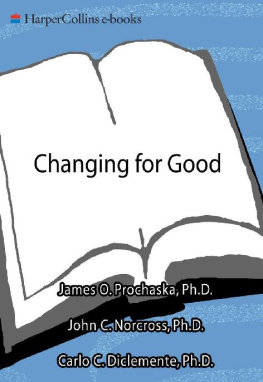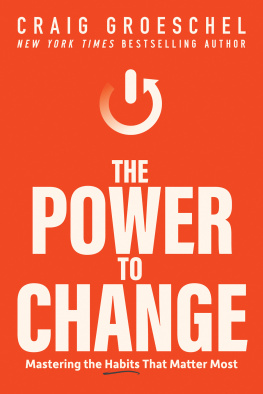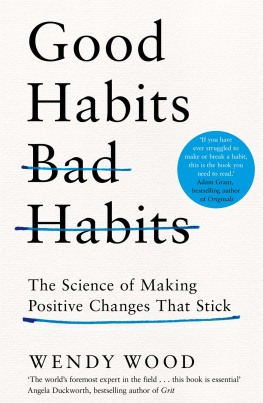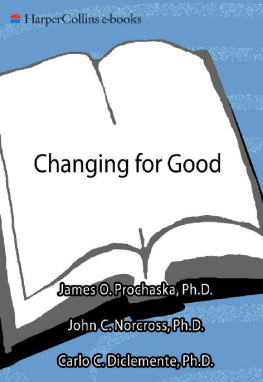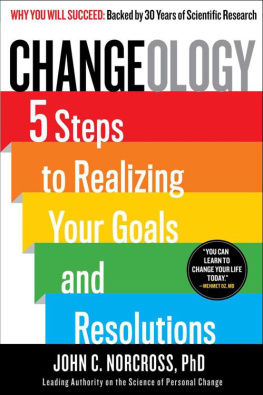James O. Prochaska, Ph.D.
John C. Norcross, Ph.D.
Carlo C. DiClemente, Ph.D.
A Scientific Revolution
WELCOME OR NOT , change is unavoidable. Life itself is change, as the Greek philosopher Heraclitus observed over 2,500 years ago. Each moment is different from every other. Nothing remains static for an instant, from a planetary to a molecular level. Few of the changes we experience are under our control: When we watch the often tragic history of the world unfold, just as when we face our personal tragedies, we may feel helpless, or at least limited as to what we can do. Even the unexpected rain on a summer vacation is frustratingly out of our control. And, of course, we have no say over the passage of time.
Although we cannot intentionally change many aspects of ourselves or our world, we can exert some power over the courses of our own lives. We can work to improve our economic situations, our family ties, and the condition of our homes. There are other kinds of changes we can make by ourselvesof our behaviors, thoughts, and feelingsand these are the kinds of changes that concern us here.
For over twelve years now, my colleagues and I have dedicated our efforts to discovering how people intentionally change. We have been searching for an underlying structure of change, one that might be common to both self-administered and therapeutic courses of treatment for addictive behaviors. People do successfully reverse complex problems and addictions, with and without psychotherapy. We wanted to know if there were some basic principles that reveal the structure of change.
We now have compelling evidence to suggest that there are. The three of us, John Norcross, Carlo DiClemente, and I, are practicing clinical psychologists, university professors, research collaborators, and self-change enthusiasts. We have conducted more than fifty different studies on thousands of individuals to discover how people overcome problems of smoking and alcohol abuse, emotional distress, weight control, as well as others. Our modelwhich draws on the essential tenets of many diverse theories of psychotherapyhas been tested, revised, and improved through scores of empirical studies, and is currently in use by professionals around the world. We never expected to produce a revolution in the science of behavior changebut that is just what our esteemed colleagues are claiming we have done.
Dr. Barbara Rimer, director of the Cancer Prevention Research Unit at Duke University, was one of the first to suggest that our work was precipitating a paradigm shift in how health professionals understand and change high-risk behaviors. Dr. Howard Schaefer, director of Harvards Addictions Treatment Center, believes that we have provided an intellectual framework for a modern reformation in the approach to changing addictive behaviors. And Dr. William Saunders of Criton University in Australia reports that it is hard to remember how health professionals used to understand behavior change before our model emerged. Health establishments that use our model include the Centers for Disease Control and the National Cancer Institute, in the United States, the National Health Service of Great Britain, and Johnson & Johnson, worldwide.
Our novel approach to change belies the old action paradigm, wherein change was assumed to occur dramatically and discretely. This action paradigm has dominated behavior change programs for the past three or four decades. Following this model, clients are enrolled in relatively brief programs designed to conquer smoking, weight, alcohol, or other problems; within weeks they are expected to take action and adopt healthier lifestyles. If they fail to take or maintain action, the clients themselves are blamed for a lack of willpower or motivation.
We were the first to consider that it is this model of behavior change that is inadequate, and not those who wish to change. Successful self-changing individuals follow a powerful and, perhaps most important, controllable and predictable course. Along this course are various stages, each calling for particular and different approaches to change. The action stage is simply one of six stagesfollowing precontemplation, contemplation, and preparation, and preceding maintenance and termination. No one stage is any more or less important than another. We have found, in a representative sample across more than fifteen high-risk behaviors, that fewer than 20 percent of a problem population are prepared for action at any given time. And yet, more than 90 percent of behavior change programs are designed with this 20 percent in mind.
Our scientific approach to self-change requires that you know what stage you are in for the problem you want to overcome. The key to success is the appropriately timed use of a variety of coping skills. During our studies, we have found much that is encouraging, including the fact that even people who are not ready to act can set the change process into motion. Our model can benefit individuals in any stage of a problematic behavior, from those who dont want to change to those who have spent years hoping to changesomeday.
The model is being applied by researchers to help understand how people change in a remarkable range of circumstances. The stages of change are employed in rehabilitation programs designed for delinquent adolescents, cocaine and heroin addicts, and patients with brain injury; in therapeutic courses for clients suffering from interpersonal problems or depression, and for alcoholics and alcohol abusers; and in clinical trials of psychotropic medications for patients with anxiety and panic disorders. The model has also been used to change behaviors of sedentary people and people with high-fat diets, people who allow themselves to be overexposed to the sun, adolescent and adult smokers, and dozens of other groups.
Up until now, only a minority of psychotherapists were intuitively aware of how to guide self-changers through the different stages. This explains why so few people with problems go to excellent action-oriented treatment programs; fewer than 5 percent of smokers, 10 percent of alcoholics or obese individuals, and 25 percent of people with mental health disorders ever seek psychotherapy. It also helps to explain why over 45 percent of clients drop out of psychotherapy prematurely, since treatments too often dont match the stage clients are in.
Contrary to what many people believe, self-changers are just as successful in their efforts to change as those individuals who choose to enter therapy or join a professionally run program. The vast majority of people who change never visit a mental health professional or participate in an organized program. They cope with their difficulties themselves, using their own capacities and resources, drawing on others for support, and developing strategies based on hard experience. After years of ongoing work, we have gathered and evaluated data from thousands of these successful self-changers. And it is their experience upon which we have based our book, rather than on academic theory or expert opinion.

